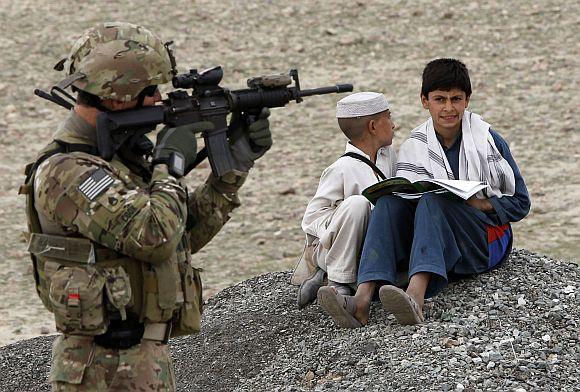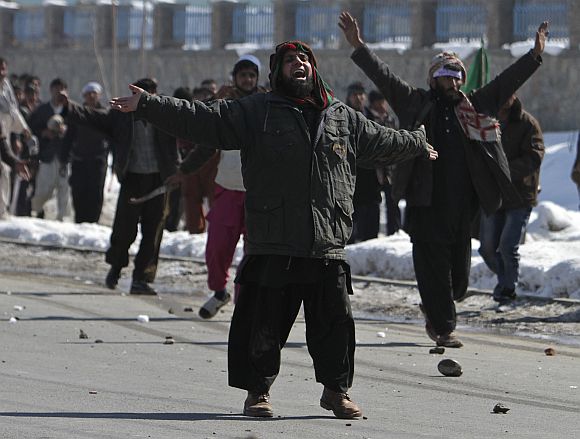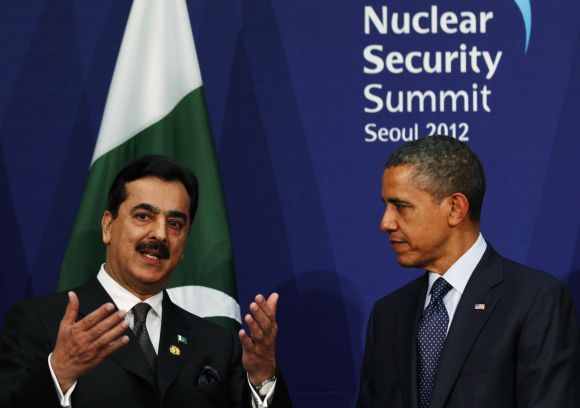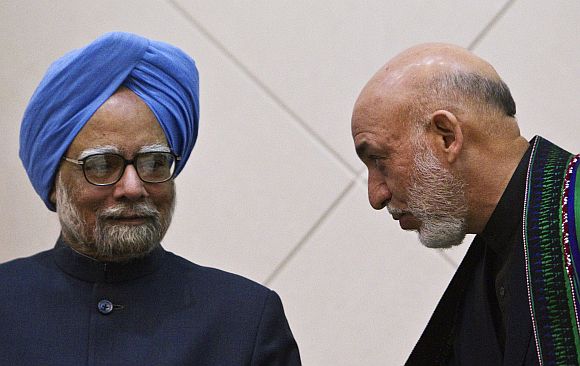 | « Back to article | Print this article |
Why India must take a proactive Afghan stand NOW!
India cannot continue with its ultra cautious stand on Afghanistan for much longer given the faster than expected reduction of the military footprint by the Western powers, says Harsh V Pant.
For the West, the ground realities in Afghanistan are turning from bad to worse and there seems to be no easy resolution in sight.
After an American soldier shot dead 16 Afghan civilians, the West is struggling to respond to an ever worsening situation.
A series of events -- the killings last week, the Koran burnings and the emergence in January of an Internet video showing three Marines urinating on the corpses of Taliban fighters -- have inflamed Afghans to an unprecedented degree.
Please click NEXT to read further...
'Afghan forces must take the lead combat role earlier than planned'
A few days back, British Prime Minister David Cameron visited Washington to underline with United States President Barack Obama that Afghan forces should take over a lead combat role in the country by mid-2013, earlier than planned.
British and US combat troops are expected to leave Afghanistan completely by the end of 2014. The two leaders acknowledged that Afghanistan would not have a "perfect democracy" by 2014.
But they envisaged "leaving Afghanistan looking after its own security, not being a haven for terror, without the involvement of foreign troops." Cameron, himself, has made it clear that he thinks that the public "want an endgame" to the war in Afghanistan.
President Obama says the United States, Britain and their NATO allies are committed to shifting to a support role in Afghanistan in 2013 and that next phase in the transition will be an important step in turning security control over to the Afghans by the end of 2014.
The Afghan scenario is changing rapidly
Under public pressure, important changes are taking place in the Western strategy towards Afghanistan. The most significant of which is the moment at which Afghan troops are expected to take what's called the "lead combat role" is being gradually speeded up -- something that will speed up the return of British and American troops.
Till last year, Washington was insisting that all of Afghanistan will have begun the process of transition by the end of 2014. And then in February this year the US Secretary of Defence Leon Panetta said the process would, he hoped, be complete by mid to late 2013, bringing forward the moment that Afghan troops will take the lead combat role. What this means is that from the very beginning of 2013, there will have to be a steady withdrawal of British and American troops.
Speaking to US and Afghan troops at Camp Leatherneck, Panetta sought to tamp down worries about the course of the US war effort following the killing on Sunday by a US staff sergeant of as many as 16 Afghan civilians, as well as nationwide riots in the aftermath of an inadvertent burning of Korans last month by US troops.
He also touted some figures to showcase that the US strategy is indeed working in Afghanistan. Attacks against US and Afghan troops are down 24 percent over the last 12 weeks compared to a similar period a year ago, the figures show.
Even in eastern Afghanistan, along the border with Pakistan, attacks have started to drop after holding steady or rising most of last year.
US has failed to stop Pak from providing sanctuaries to Taliban
Attacks in the east on US and Afghan troops fell by 36 percent over the same period, according to the latest US military figures.
Pentagon officials tout the statistics as proof that the current approach is working, though some of the drop in violence can be attributed to an unusually harsh winter.
Meanwhile, Afghanistan President Hamid Karzai wants a smaller, more restricted US presence right away, but he doesn't favour a wholesale American departure, according to diplomats in Kabul, because US troops, and US financial assistance, are essential to propping up his government.
The Obama administration is keen to negotiate a long-term security partnership with Afghanistan -- which would permit US forces to remain for training and counterterrorism purposes -- before a NATO summit this May.
America's special representative for the region, Marc Grossman, has been holding secret talks with the Taliban for more than a year now.
Grossman has also been talking with neighbouring countries about building a structure to keep a future Afghanistan from disintegrating.
But all the evidence so far shows that Washington has singularly failed in being able to stop Pakistan government from maintaining sanctuaries for Taliban militants. And no guerrilla movement that has had a set of sanctuaries -- let alone the active help of a powerful military like Pakistan's -- has ever been eliminated.
India has not emerged as a reliable strategic partner in Afghanistan
As events move rapidly in Afghanistan, New Delhi remains preoccupied with the shenanigans of its political class. It is not clear at all if India remains committed for the long haul in Afghanistan and prepared to make some hard choices.
India cannot continue with its ultra cautious stand for much longer given the faster than expected reduction of the military footprint by the western powers.
Last year India had signed the strategic partnership agreement with Afghanistan as it was forced to reassess its options in its neighbourhood. Since then, however, the domestic political turmoil has precluded the evolution of a sustained approach vis-a-vis Kabul.
The problem with India is that it has failed to emerge as a reliable strategic partner for its allies in Afghanistan.
It was interesting to hear Afghan scholars visiting India a few days back asking New Delhi to shed "Gandhigiri" and to play a more assertive role in their country.
New Delhi has partners in Kabul who want a more proactive role for India. It is India's own defensiveness that is holding it back.





